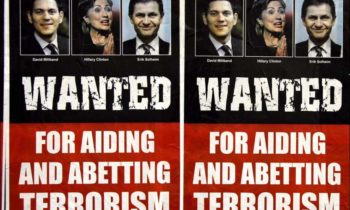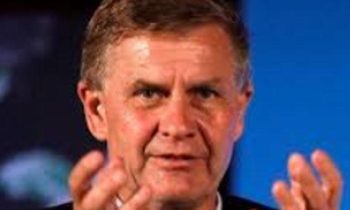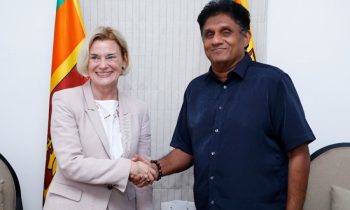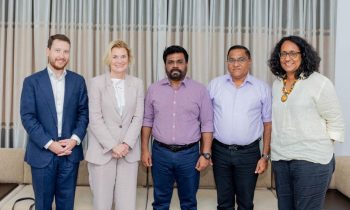 Former Norwegian peace facilitator Erik Solheim who told to Sri lankan media last year that he would reveal information to a UN probe on Sri Lanka’s last phase of the war and the white flag issue if he was called to give evidence, admitted that he had indeed stood before the panel and gave evidence. He also said he was ready to share all he knew before any national or international tribunal.
Former Norwegian peace facilitator Erik Solheim who told to Sri lankan media last year that he would reveal information to a UN probe on Sri Lanka’s last phase of the war and the white flag issue if he was called to give evidence, admitted that he had indeed stood before the panel and gave evidence. He also said he was ready to share all he knew before any national or international tribunal.
Solheim who was also the ex-Minister of Environment and International Development of Oslo and at present the Chair of the OECD Development Assistance Committee (DAC) told Ceylon Today in an exclusive interview that although he received harsh criticism from the former leader of the country, the government knew about his involvement in the peace process and there was no hidden agenda.
Following are excerpts:
?: From 2002 to 2008, Oslo played a major role in peace negotiations until former President Mahinda Rajapaksa terminated the Oslo deal alleging that they were supporting the LTTE. You were one of those key players but faced criticism from all those involved in the conflict. You, once again appear to be getting involved in Sri Lanka’s political, social and economic affairs. Can you explain your new involvement with Colombo?
A: I will remain a lifelong friend of Sri Lanka. I have been heavily criticized by both Tamil and Sinhala extremists, but that will never deter me from giving support to all the fantastic people of the most beautiful island on the planet.
? : We hear that you are coming back to Sri Lanka. When will you be here?
A: I won’t come before the parliamentary elections as some people will find that undue. I may come later this year if invited by any institution in Sri Lanka.
? : You tweeted that recent elections brought ‘shock and joy to Sri Lanka’. Were you also shocked and delighted over Rajapaksa’s defeat? If so why?
A: As with India, the US and the international community at large, I am very happy that the people of Sri Lanka on 8 January decided to restore democracy.
? : In your tweet you said, ‘positive meeting with Tamil diaspora in Oslo. Will strongly assist Sri Lanka with investment and aid from the huge resources in the diaspora’. Are you their mediator or spokesperson?
A: Not at all! But I occasionally meet Sri Lankans living abroad. I encourage all the talented Sri Lankans in other parts of the world to use their vast abilities for the benefit of the Sri Lankans. So many Tamils and Sinhalese in the diaspora are doctors, engineers, bankers and dentists. They have a lot of expertise to offer. They are also a major potential source of investment to increase the economic growth and prosperity of the country.
? : However, the ban on Tamil diaspora organizations has not been lifted yet. Do you have concerns about that?
A: That is a matter to be resolved in a dialogue between the Government of Sri Lanka and the Tamil diaspora.
? : You have been in the bad books of Sri Lankan politics. Despite that, you still strive to be a ‘negotiator.’ What do you stand to gain?
A: I stand to gain nothing. No one has asked Norway to negotiate. I am just sharing my modest experience and trying to promote the rapid economic development in Sri Lanka. The latter is also my job as the chair of the OECD Development Assistance Committee.
? : During an interview with Ceylon Today last year, you claimed that you would go before the International Criminal Court or any other recognized international tribunal to give evidence against Sri Lanka on alleged war crimes. Do you still stand by that statement?
A: I am ready to share all I know with any credible national or international tribunal.
? : Did the UNHRC ask you to give evidence about the last phase of the war and the white flag issue?
A: Yes. And I told them all I knew.
? : If the Tamil diaspora’s strong stance on former government’s alleged war crimes and accountability issues take centre stage, there could be political turmoil in Colombo ‘weakening’ the present government. Have you thought about it?
A: Accountability in other former war zones like Balkans, Africa and Latin America has always taken time. Everyone must show some patience, but at the end, war crimes will be exposed and brought before Court. It is important to condemn all war crimes in equal terms. Very clearly both the Government of Sri Lanka and the LTTE committed atrocities.
The most urgent issue is to establish the truth. Survivors need to know what happened to their loved ones. How can a woman continue and restart her life if she does not know whether her husband or children are still alive?
? : How can there be a true sense of reconciliation with the unchanged mindset of the Tamil diaspora, which is weakening every effort of the government?
A: I sense a clear change of direction among the Tamil diaspora. More and more people are ready to work with the government for reconciliation, long-term peace and economic reconstruction of the North and East. But for this to happen there is also the need for a stronger party, the Sinhalese and the government to reach out to Tamils.
? : Wouldn’t it negatively impact on your second stage engagement with Sri Lanka, trying to bridge the diaspora with the government?
A: I definitely consider the Tamil diaspora as a huge asset to the future of Sri Lanka. They have such a lot to offer. Why always focus on the negative?
? : The suppression of the LTTE led to a political solution diluted far from federalism and the political possibilities are at the lowest since 1976. Can you comment?
A: I am confident that the government and the Tamil National Alliance (TNA) will come forward to find a lasting solution to the Tamil national question through negotiations. Such a solution will have to be federalism or another version of devolution of power to Tamils in the North-East. Indian Prime Minister Narendra Modi spoke passionately about federalism while visiting Colombo and Jaffna. Nearly all international observers share his views.
? : The new Government of Sri Lanka denied entry to the UNHRC panel of experts to visit besides getting the UNHRC to postpone the Lanka review to September 2015. At the same time, US Secretary of States, John Kerry urged Sri Lanka to cooperate with UN war-crimes probe and to release remaining political prisoners. There is a divergence of views between the US and Colombo. How do you view it?
A: I was very impressed by the speeches made by John Kerry in Colombo. This was the first visit of an American Foreign Minister to Sri Lanka in 43 years. It is a strong signal of the international support for lasting peace and economic development in Sri Lanka.
? : Are there chances for Colombo review in Geneva session in September to be ‘diluted’ or ‘softened’ in favour of the government as they have proposed for a lasting political solution for the Tamils of Sri Lanka?
A: The UN does not operate that way. They will publish the report establishing the most accurate version to date of what happened in the last phase of the war. Don’t expect it to be soft on any crime, whoever committed it.
Q : You tweeted that UN High Commissioner Zeid bin Raad assured you that he will release the Sri Lanka report in September and it will contain surprises. Can you elaborate?
A: We discussed human rights on all continents, for instance the present situation in Burundi. Regarding Sri Lanka he firmly confirmed that the UN Human Rights report will be released in September.
? : There is concern over police harassment of Tamil journalists and Tamil returnees from overseas and, the diaspora says Sri Lanka is continuing to fail to deliver justice to the Tamils. How can you bridge the diaspora with Colombo at this point?
A: These acts are remnants of a negative past. I am very optimistic that over time all this will stop.
? : Do you think that Tamils have confidence in the present government in resolving the national issue, because several members of the former regime are still in power with the new government?
A: I have a lot of confidence in the present President Maithripala Sirisena and the government. Tamils and Muslims overwhelmingly voted for Maithripala, knowing that Ranil Wickremesinghe would be the Prime Minister. But nothing in life will come by itself. Tamil rights in Sri Lanka will not be ‘given’ by anyone but be established through non-violent political struggle by the Tamil community.
? : If the new government offers you a role in the reconciliation process, will you accept such an assignment?
A: I am always ready to assist Sri Lanka, but there is no such offer in the pipeline.
(Ceylontoday)



